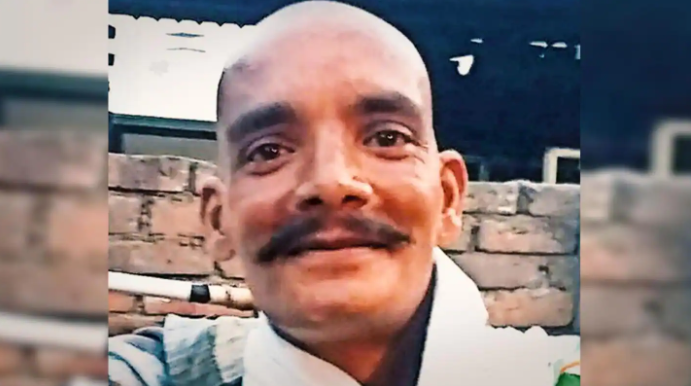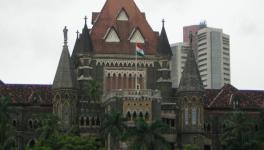Why Killing of Lakhbir Singh Concerns Everybody and Not Just Sikhs

Image Courtesy: NewsBytes
The rather lonely cremation of Lakhbir Singh, a Dalit Sikh from the Tarn Taran district, amidst heavy police security and only a handful of relatives attending, was a shocking event on multiple levels. Even more so was the decision of the village community--barring a few exceptions--to stay away from the ceremonies. The locals even prevented the family of Lakhbir from conducting a religious recital. The villagers had earlier resisted even his cremation in their village. The reason was that Lakhbir had been accused of ‘sacrilege’ by a group of Nihangs. They allegedly tortured and killed him at the Singhu border, one of the centres of resistance for the historic farmer’s struggle.
As the story goes, a group of Nihangs “caught” him for ‘desecrating’ the holy book of the Sikhs and killed him. The man who claimed responsibility for his killing is said to belong to the Nirvair Khalsa-Udna Dal, a sub-sect of Nihangs, justified it in no uncertain terms. A key Nihang leader organised a press conference in which he tried to inflame sentiments by glorifying the execution.
There is still no way to ascertain why exactly Lakhbir was brutally murdered, but we can draw some reasonable surmises. First, it could have been a murder sparked by the growing influence of religiosity in society. We increasingly notice that people’s sensitivity towards the pain or suffering of others is numbing, while religion is getting painted in political colours.
Second, there is a view that Lakhbir was lured to the Singhu Border a day before his death by some “bada aadmi”. His sister has said he recently started receiving phone calls from someone who promised him cash. There is a third possibility; that Lakhbir visited the protest site of his own volition.
Lakhbir’s killing over alleged ‘sacrilege’, a burning topic in Punjab, could very well be a ploy to drive a wedge between his community and the Jat Sikhs. Surely it will spark speculation that Punjab recently got its first Dalit Sikh Chief Minister in Charanjit Singh Channi, which caused consternation in multiple quarters.
Besides, the killing at Singhu has taken attention from the Lakhimpur Kheri incident, where a vehicle in which a central minister’s son was allegedly travelling mowed down farmers--an event that has the government on the defensive.
Besides, the killing of Lakhbir has been used by vested interests to pass judgement on the historic farmer’s movement against the three draconian farm laws, with some saying it should end. A leading newspaper has reported that the head of the Nihang sect met the Union Minister for Agriculture in July, and they apparently discussed ending the farm stir.
The leaders of the farmer movement have condemned the killings and asked the government to punish the guilty. Refusing to get carried away by sectarian rhetoric, they have continued their struggle. Indeed, a thorough investigation is needed to book the masterminds and perpetrators of Lakhbir’s murder. Further, under various pretexts, killing in the name of faith is slowly rampaging through the country. This tendency, too, must be checked.
‘Sacrilege’ is still a burning issue in Punjab politics. In 2015, incidents of ‘sacrilege’ of holy books suddenly surged, sparking massive demonstrations. Once, the police had to resort to firing, killing two protestors. The Akali Dal-BJP government ruling the state was on the defensive and passed a law in March 2016 that mandates a stringent life term (instead of three years in prison) for the crime. It was a retrograde move, for it legitimises a politics of hurt sentiments and pushes the idea of ‘blasphemy’ as a crime. Blasphemy laws can jeopardise freedom of thought and expression, and the state government did not consider the havoc such laws cause in many countries.
Earlier, the Punjab bill had sought to amend the Indian Penal Code and Code of Criminal Procedure to punish the desecration of the Sikh holy text Guru Granth Sahib. The central government returned this bill, citing the reason that it violated the principle of secularism. When the Capt Amarinder Singh-led Congress government came to power in 2017, it passed a new bill that included scriptures of other religions, which the Centre approved. The bill inserted section 295AA in the IPC to provide that “whoever causes injury, damage or sacrilege to the Guru Granth Sahib, the Bhagvad Gita, the Quran and the Bible with the intention to hurt the religious feelings of the people, shall be punished with imprisonment for life.”
This expansion of blasphemy laws came under intense criticism, for, instead of making the state more distant from religion, it would “further consolidate the hold of sectarianism, and strengthen the hands of religious extremists on all sides”. Many pointed out that such laws are misused the world over “against minorities and weaker sections, to harass them, exact revenge and also to settle personal and professional quarrels, all matters entirely unrelated to blasphemy”.
The spread of notions of blasphemy and laws to prevent it can play havoc with ordinary people. In 2016, two women, both named Balwinder Kaur, were killed over alleged acts of blasphemy. Fifty-five-year-old Balwinder was killed in her home in village Veroke, Amritsar, on 9 September while on bail. She was jailed in Nov 2015 allegedly for ‘desecration’ of holy scripture and was out on bail. The police had arrested her for allegedly entering a gurudwara wearing slippers, which was fanned into a major issue. The village socially boycotted her family for months. In the end, it is her husband who killed her, apparently over the “infamy” she had drawn to the family.
The other Balwinder Kaur (aged 47) of village Ghawadi was killed by fanatics also while on bail. She used to work in a gurudwara and got charged with having “torn the pages of the Guru Granth Sahib”. Her family alleged that dominant residents had trapped her. Two were arrested who belonged to a radical Sikh outfit in connection with the crime.
Judicial intervention in a few cases related to 'beadbi' or insult of religious texts, and Special Investigation Teams have not resolved the issue but further complicated it. A reason for the Amarinder Singh-Navjot Singh Sidhu acrimony was also the allegation that the state had not dealt with desecration-related cases. Even for the Akali Dal-BJP alliance, sacrilege was a big issue that caused massive losses in the 2017 Assembly election. The results of the 2019 Lok Sabha election from Punjab were no different.
Now, the killing of Lakhbir Singh could rekindle the sacrilege debate, giving politics over religion a field day, encouraging radical elements which are always seeking to vitiate the ambience. It is an open invitation for competitive political mobilisation around religion that must end before more lives are ruined.
The author is an independent journalist. The views are personal.
Get the latest reports & analysis with people's perspective on Protests, movements & deep analytical videos, discussions of the current affairs in your Telegram app. Subscribe to NewsClick's Telegram channel & get Real-Time updates on stories, as they get published on our website.
























